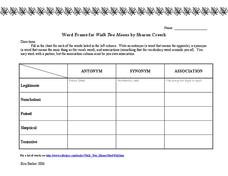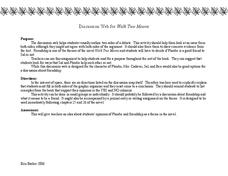English Worksheets Land
Party!
What could be more fun than two birthday parties in one day? Compare and contrast two parties with a short reading passage and a graphic organizer that focuses on character, setting, and events from the story.
English Worksheets Land
Penny and Her Dad
A divorce can seem like everything's changing, but some things do stay the same. Read a passage about Penny and her parents, comparing and contrasting the ways her parents' houses are the same and are different.
English Worksheets Land
Charlotte and Cherie
Could you imagine running into a stranger who looked exactly like you? Class members read about identical twins who were separated at birth, and answer three reading comprehension questions to practice comparing and contrasting details...
Manchester College
What’s Your Point of View?
Work on deciphering the point of view of various pieces of literature. As readers review the concepts of first, second, and third person perspective, they apply what they know to different passages.
Novelinks
The Lion, the Witch, and the Wardrobe: Picture Book Strategy
Picture books aren't just for primary learners. Your scholars compare and contrast literary themes between the novel, The Lion, the Witch, and the Wardrobe by C.S. Lewis, and the children's book, The Dream Tree by Winfried Wolf through...
K12 Reader
Point of View: Who Is Telling the Story?
See how famous books of literature have different perspectives with a short worksheet. After reviewing the difference between first and third person points of view, learners look over six passages from various novels and decide which...
K12 Reader
Narrator’s Point of View Flow Chart
How can you tell what point of view a narrator is using, and why does it matter when reading or writing? Use a handy flow chart to determine whether or not your narrator is telling the story from a first or third person point of view.
K12 Reader
Change the Point of View: Third Person to First Person
Use Jack London's The Call of the Wild to help young writers learn the difference between first and third person points of view. After they read a passage from the novel, they rewrite it in the first person point of view.
K12 Reader
Narrator and Point of View
Point of view is important when choosing a narrator. Help young writers distinguish between first and third person point of view with an activity that features excerpts from Robert Louis Stevenson's Treasure Island. After reading four...
K12 Reader
Change the Point of View: First Person and Third Person
How is a story different when told from various points of view? Learn about first and third person points of view with an activity based on Robert Louis Stevenson's Treasure Island. Readers examine a passage written in first person, then...
K12 Reader
Context Clues: The Meaning Is There!
Learning how to use context clues is helpful for both reading comprehension skills and to determine the meaning of unfamiliar vocabulary words. As they read ten sentences with underlined words, learners choose the most...
City College of San Francisco
Making Inferences: Reading Between the Lines
Have you ever read part of a story and had to figure out what the rest was about? Practice making inferences with several short passages and multiple choice questions.
North Clackamas School District
Context Clues: Synonyms
What do you do when you find a word that's not familiar to you? Help readers use context clues when encountering unfamiliar words with a grammar activity. They note the parts of the sentences that show the meaning of the word, write how...
Bethel School District
Observations and Inference
What's the difference between qualitative and quantitative observations? Learners make observations, inferences, and predictions about their environment with a set of questions and activities that are applicable to either language arts...
Curated OER
Walk Two Moons: Hook and Concept of a Frame Story
As an introduction to Sharon Creexh's Walk Two Moons, a volunteer dons a pair of boots and walks about the classroom.Observers then ponder the axiom, Don't judge a man until you've walked two moons in his moccasins. Their collaborative...
Curated OER
Walk Two Moons: Word Frame
Middle schooler practice their dictionary and thesaurus skills with this vocabulary assignment. Using the provided graphic organizer and the word list from Walk Two Moons by Sharon Creech, readers define each word, and find a synonym...
Curated OER
Walk Two Moons: Question Answer Relationship Strategy
Middle schoolers develop a strategy as they read excerpts from Walk Two Moons. Using question and answer relationship strategies class members bolster their reading comprehension as they appropriately identify and create questions.
Curated OER
Walk Two Moons: Discussion Web
Is Phoebe a good friend to Sal or not? After reading chapters twenty-five and twenty-six of Walk Two Moons, class members use the provided graphic organizer to develop an argumentative piece. Writers must decide if the two main...
Curated OER
The Lion, the Witch and the Wardrobe: Problematic Situation
Accompany The Lion, the Witch, and the Wardrobe by C.S. Lewis with this activity learning exercise. Spark a discussion about the story's characters' decision making skills while making inferences and allow learners to connect personally...
Curated OER
Inspire a Life of Reading
Making letters out of goop, sight word bingo, tic-tac-toe vowels. Download this packet loaded with activities designed to engage beginning readers. Although designed for adults, many of the activities are appropriate for any age group.
Curated OER
Points of View
Cinderella is a classic love story when Cinderella is the protagonist—but what happens if a stepsister tells the story? Focus on point of view with a lesson plan about fairy tales and story elements. After reading a few familiar fairy...
Ohio Department of Education
Observe Then Infer
To develop their skill at drawing inferences from observations, sixth graders rotate through six stations, conduct a series of experiments, make observations, and draw inference from what they observe.
Roseburg Public Schools
Library Skills and Literature
The library is such a valuable resource for kids of all ages. Help elementary readers learn all about parts of the library, text features for both fiction and nonfiction text, and different ways to find books that they want to read.
Premier Literacy
Point of View
Incorporate technology into a literature lesson with an innovative language arts lesson. Middle schoolers read an electronic version of original stories or fairy tales, and after determining the point of view, rewrite the tale from a...

























